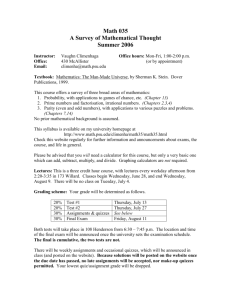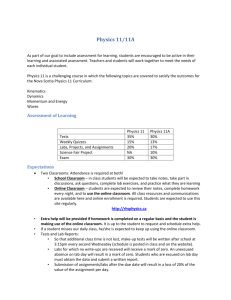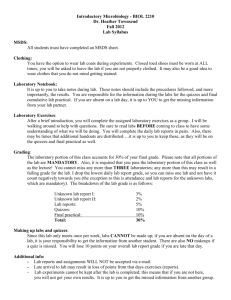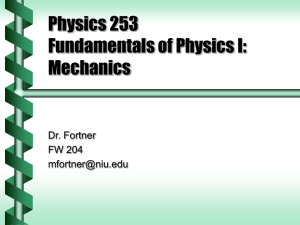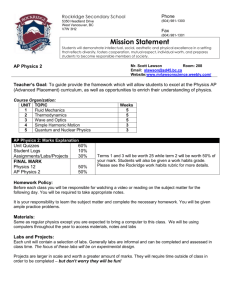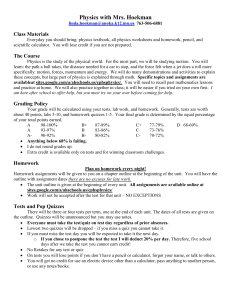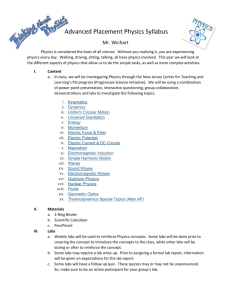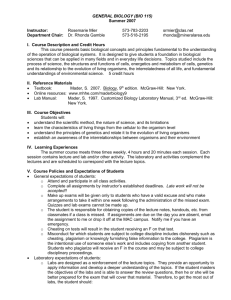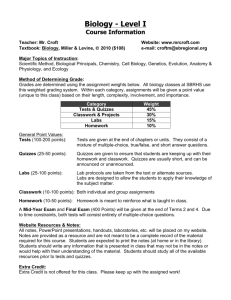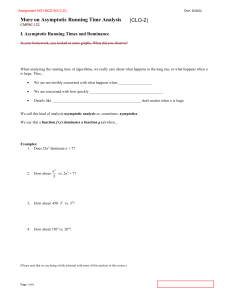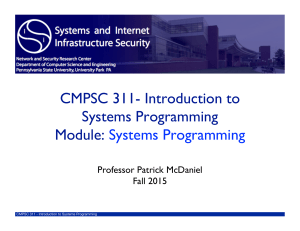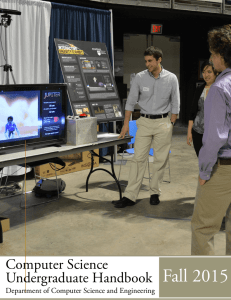Introduction to C++ - Computer Science and Engineering
advertisement
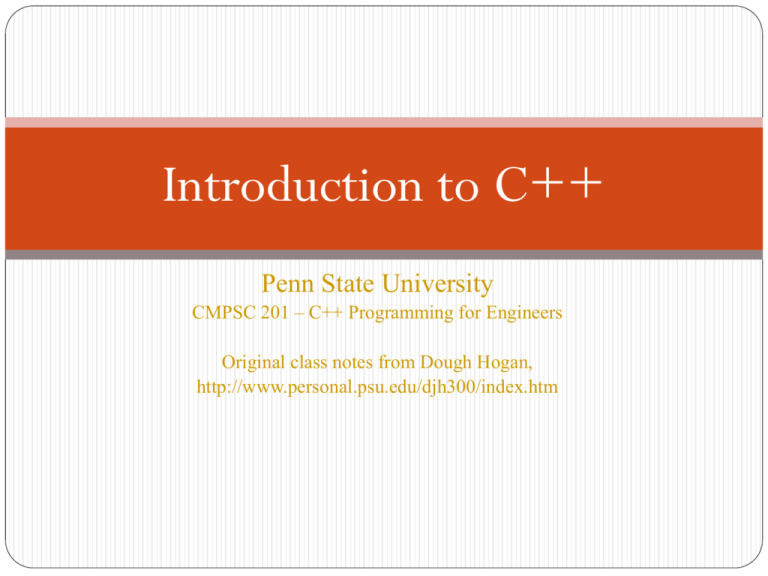
Introduction to C++ Penn State University CMPSC 201 – C++ Programming for Engineers Original class notes from Dough Hogan, http://www.personal.psu.edu/djh300/index.htm Class Information Class Meeting Time and Place Lectures/Labs: M/T/R/F 11:10Am – 12:25Pm Class Dates: 06/10/2010 - 08/11/2010 About Me I am a Ph.D. student at CSE department I work with Dr. Swarat Chaudhuri My area of research is Programming Languages, and in particular Program Verification Email: ssn123@cse.psu.edu Office: IST Building, Room 337 Office Hours: Monday, 2:00pm-4:pm/ Thursday 2:30pm-3:30mp About TA Name:Orhan Kislal Email: omk103@psu.edu Office: IST Building, Room 346D Office Hours: Thursday, 12:30pm – 2:30pm Prerequisite MATH 140, and MATH 141 particularly the big-picture ideas (derivatives and integrals, how they're defined, and what they represent) No programming experience is assumed! Appropriate Course Selection CMPSC 200, 201, and 202 -- are targeted at engineers. CMPSC 121 is targeted at Computer Science and Engineering majors. CMPSC 101 and 102 are targeted at a more general audience. The university will not count more than one of these courses toward your degree program, so make sure you're in the right! Textbooks Matlab Text: Etter, Delores M. and David C. Kuncicky and Holly Moore. Introduction to Matlab 7. Upper Saddle River, NJ: Pearson, 2005. (ISBN 0131474928) C++ Text: Y.Daniel Liang. Introduction to Programming with C++. 2nd ed. Optional C++ Text: Mercer, Rick. Computing Fundamentals with C++. 2nd ed. Wilsonville, OR: Franklin, 1999. (ISBN 1887902368) (Book are often sold with a disk we won't use.) Primary resource Online course notes (originally provided by Dr. Doug Hogan) will be your primary resource for the majority of the course. You will be expected to review the notes posted for lectures before the next coming lab session. You'll experience the greatest success comprehending the material if you spend some time with it outside of class between your first exposure to it in lecture and your hands-on practice in lab. We will have a course website as ASAP! But before that everything needed, including class notes, will be posted on Angel. Other Materials C++ Compiler, available in the labs. You may want one at home for convenience. (See the Penn State Computer Store for Visual C++ for PCs or try a free compiler like Dev C++. For Macs, if you are running OS X, you have a free professional development tool called Xcode that you can install from your Mac OSX Install DVDs and learn from how-to page (in the course website). Other Materials (cont.) Your Notebook!! keeping a three-ring binder with your class notes, exams, quizzes, and programming assignments, is recommended. You may find it useful during the course See the "Resources" link in the course website Components of the Grade Quizzes and Other Class Participation Activities: (10%) Quizzes may be given at any class session. Most will be unannounced. We will occasionally take class attendance. Programming Labs: (20%) Short or medium length programming assignments, given during the Monday/Tuesday/Thursday sessions. Labs can be either returned by the end of the lab session, or at most by 10:00am before the beginning of the next class. The length and involvement of the activity will depend on the topic. Some labs may build upon others. Components of the Grade (cont) Programming Projects: (25%) More involved programming assignments, completed out of class. Midterms Exams: (20%) Comprehensive Final Exam: (25%) Final exam is covering programming concepts and theory from the entire course. The exam date and time will be scheduled by the University later in the term. Do not make travel plans before your final exam schedule is available. Components of the Grade Quizzes and Other Class Participation Activities: (10%) Programming Labs: (20%) Programming Projects: (25%) Midterm: (20%) Final Exam: (25%) Programming Assignment Guidelines See the Style Conventions Use the provided lab report template (but always check the specific directions for the assignment to see what's required.) (Style Conventions and lab report template will be posted on Angel). Following the style conventions will be important in grading. Assignments with extremely poor formatting may be returned for reformatting and resubmission with penalty! Autobiography Please type and print your answers to the questions in the autobiography and bring a copy of your answers to the next Monday class or send it to me through Angel. Learning Goals Brief introduction to basic computer science theory, including components of a computer system and their roles. Learn about how compilers work and the compiling and debugging of code General programming practices such as the software development life cycle, programming style, documentation, algorithm design, and efficiency Learning Goals (cont.) Sequential control flow and basics of C++ programming: input/output, declarations, keywords, mathematical operations, text/string manipulation, sequential control flow Learning Goals (cont.) Selection control structures and their implementation in C++: if, if...else, switch Loop control structures and their implementation in C++: for, while, do...while loops Subprogram control structures (methods) and their implementation in C++, including parameter passing and the scope of identifiers File input and output streams in C++ Learning Goals (cont.) Arrays, one-dimensional and two-dimensional, including searching and sorting Other programming techniques as they arise Using computer programs to solve problems in engineering and science, particularly including numerical problem solving techniques Basics of MATLAB software.
